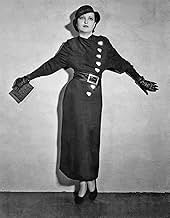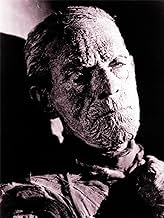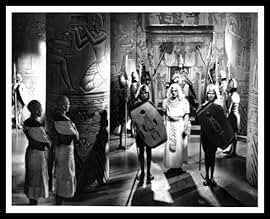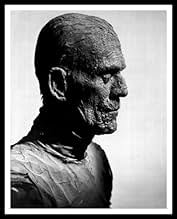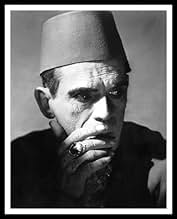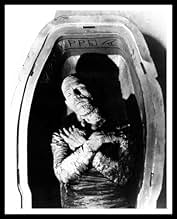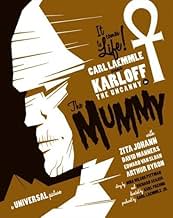AVALIAÇÃO DA IMDb
7,0/10
32 mil
SUA AVALIAÇÃO
Uma múmia egípcia procura na cidade do Cairo pela garota que ele pensa ser sua princesa há muito tempo perdida.Uma múmia egípcia procura na cidade do Cairo pela garota que ele pensa ser sua princesa há muito tempo perdida.Uma múmia egípcia procura na cidade do Cairo pela garota que ele pensa ser sua princesa há muito tempo perdida.
- Direção
- Roteiristas
- Artistas
- Prêmios
- 1 vitória e 4 indicações no total
Henry Victor
- The Saxon Warrior
- (cenas deletadas)
Arnold Gray
- Knight
- (cenas deletadas)
Florence Britton
- Nurse
- (não creditado)
Jack Deery
- Party Guest
- (não creditado)
Bill Elliott
- Party Guest
- (não creditado)
Leyland Hodgson
- Gentleman #2 at Cairo Party
- (não creditado)
Eddie Kane
- Inspector's Assistant
- (não creditado)
Tony Marlow
- Police Inspector
- (não creditado)
- Direção
- Roteiristas
- Elenco e equipe completos
- Produção, bilheteria e muito mais no IMDbPro
Avaliações em destaque
I love these Universal horror movies. This one is all atmosphere. The lighting, the focus on Karloff's eyes and his threatening persona carry the film. When I was in elementary school (my kids would say not long after this film was made), I had another kid scare the daylights out of me by describing the internment of the Egyptian rulers. The taking of the body, perfuming it, placing it in a room full of gold, then killing the slaves so that only the priests would know the actual resting place of the body. There was also the bit about being wrapped alive for burial. I'll tell you.
The effect of that story, which is portrayed in the movie, put a bigger scare into me than any movie I've ever seen. Since this one was really the only one we would ever see on television, I watched it every time I could. Isn't it interesting that both the Lugosi "Dracula" use a quotation from "Swan Lake" as a theme song. I've always wondered why that is. It is certainly eerie and as the credits roll, it builds in intensity. I was told once that Tchaikovsky would probably do movie soundtracks if he were alive today. Pardon my digressions. It is interesting that the mummy (as a fully wrapped personage) really doesn't appear after the beginning sequence--we just know that old Boris is in the process of decay and will eventually be sent to his eternal reward. As usual, the scientists and those who should know, carelessly leave the young woman unattended and he makes his move. The threatening suavity of Karloff is the high point of the movie. I feel the world received such a gift when these films were made. It is a delight, full of frightening images and classic moments.
The effect of that story, which is portrayed in the movie, put a bigger scare into me than any movie I've ever seen. Since this one was really the only one we would ever see on television, I watched it every time I could. Isn't it interesting that both the Lugosi "Dracula" use a quotation from "Swan Lake" as a theme song. I've always wondered why that is. It is certainly eerie and as the credits roll, it builds in intensity. I was told once that Tchaikovsky would probably do movie soundtracks if he were alive today. Pardon my digressions. It is interesting that the mummy (as a fully wrapped personage) really doesn't appear after the beginning sequence--we just know that old Boris is in the process of decay and will eventually be sent to his eternal reward. As usual, the scientists and those who should know, carelessly leave the young woman unattended and he makes his move. The threatening suavity of Karloff is the high point of the movie. I feel the world received such a gift when these films were made. It is a delight, full of frightening images and classic moments.
What director Karl Freund achieves in this movie is nothing short of staggering, even at a remove of nearly 70 years. If this same story, with this same basic approach, were released today, it would still be great. And especially now, when the box office successes of such movies as The Sixth Sense, What Lies Beneath and The Blair Witch Project demonstrate that audiences are hungry for a return to the classic horror virtues of style, mood and suspense (as opposed to the tired formula of gore, in your face shocks, special effects, and more gore) The Mummy would seem ripe for some kind of revival (too bad the lame Brendan Fraser vehicle has stolen its title - though nothing of its wit, skill, or conviction).
What makes this movie so good is. . . gosh, there are so many things! Start with the creepy and unsettling tone, which the movie establishes right away. The very first scene - where the Mummy is awakened - is one of the greatest ever for pure atmosphere and chills. Look at the way Freund *under* plays it, every step of the way. Instead of piling on a crescendo of "scary" music and using odd or distorted camera angles to dramatize the situation, he has the action play out in total silence and with a resolutely still camera, the tasteful cut-aways (from the mummy in the tomb to the archaeologist sitting not five feet away) being the only frill. The tension which results is unsettlingly powerful - and is made moreso by the fact that the scene refuses to resolve itself in the way which we expect it to. I'll give no more details, but when you watch the film, ask yourself: isn't *this* resolution ten times more creepy and effective than the one we thought we saw coming. Already, five minutes in, it's clear that The Mummy has a far more wicked, sophisticated sense of horror than any of the other big "monsters" of the day (Dracula, Frankenstein, Wolf Man, etc.) - and a good deal more than many that have come after, too.
But of course, all the style in the world ultimately cannot save a weak or hackneyed script. And so it's a great pleasure to report that all of Freund's technical finesse is at the service of a really super cool story. Not content to be merely a spooker, the film is also - nay, one might even say primarily - a tragic love story: one that deals intelligently with such provocative notions as forbidden love, reincarnation, religious desecration, inhuman torture, and a strong sub-theme of the desire to respect the past vs. the need to live for the moment. All of these elements swirl so ingeniously and non-didactically in The Mummy's streamlined storyline, that I'm tempted to proclaim this at once both the most compact, as well as the most ambitious, horror movie script I have ever come across.
Of course, such superlatives can get you in trouble too, so let me add that yes, there are flaws - mainly the ones endemic to all horror movies of the time. The so-called "hero" is once again a young man of no charm or interest whatsoever. Meanwhile, the venerable old "expert" who must explain the ways of the monster to everyone else is already a tired convention at this point - and since the role here is played by Edward Van Sloan (who was Van Helsing in the original "Dracula" and its sequel "Dracula's Daughter", as well as Dr. Waldman in "Frankenstein") there is an even greater than usual sense of perfunctoriness to the undertaking. However, even here the movie displays its strength and uniqueness by toying with our expectations of what these stock characters will be able to do and achieve. Whereas in most other horror films, the romantic lead and the crusty old doctor end up being the white knights who vanquish the monster and save the girl, here they operate on a much less exalted plane - and are thereby made more human in the process.
As for faults, that's pretty much it. The pace is masterful; some have called it slow, but I strongly disagree. The film flows naturally and inevitably, with every scene building upon the one before it. There's nothing extraneous in the way it unfolds - achievement enough when compared to the countless other horror movies of its day. As an added treat, there is a flashback sequence in the middle of the movie that is a mini-masterpiece all by itself: it has all the fury and grandeur of a D.W. Griffith silent, honed and encapsulated down to its bare essence. It tells the tale of the title character's previous life with an economy and precision that could still serve as a model for filmmakers today. And, well, most of all, the movie has. . . Boris Karloff.
I've restricted my discussion of him until the end because his towering greatness is so routinely accepted and understood that it's almost redundant to comment upon it. Also, I wanted to make clear that, though he is the film's chief asset, he is far from its only one. But there's no question that it is his stately, brooding, menacing performance that ultimately pushes this film over into the realm of greatness. The key thing here is this: while the concept of a centuries-old being raised from the dead and out for vengeance is a great *idea*, Karloff's portrayal is what gives it tangible, terrifying REALITY. Observing this man - with his stiff ramrod posture, his measured and stately movements, and his absolutely hypnotic voice - we are truly convinced, on a visceral level, that yes here indeed is the walking dead. That kind of verisimilitude is rare enough in horror movies of any era, and its presence here stands as an absolute revelation. Just as does the entirety of this wonderful, exquisitely made film.
What makes this movie so good is. . . gosh, there are so many things! Start with the creepy and unsettling tone, which the movie establishes right away. The very first scene - where the Mummy is awakened - is one of the greatest ever for pure atmosphere and chills. Look at the way Freund *under* plays it, every step of the way. Instead of piling on a crescendo of "scary" music and using odd or distorted camera angles to dramatize the situation, he has the action play out in total silence and with a resolutely still camera, the tasteful cut-aways (from the mummy in the tomb to the archaeologist sitting not five feet away) being the only frill. The tension which results is unsettlingly powerful - and is made moreso by the fact that the scene refuses to resolve itself in the way which we expect it to. I'll give no more details, but when you watch the film, ask yourself: isn't *this* resolution ten times more creepy and effective than the one we thought we saw coming. Already, five minutes in, it's clear that The Mummy has a far more wicked, sophisticated sense of horror than any of the other big "monsters" of the day (Dracula, Frankenstein, Wolf Man, etc.) - and a good deal more than many that have come after, too.
But of course, all the style in the world ultimately cannot save a weak or hackneyed script. And so it's a great pleasure to report that all of Freund's technical finesse is at the service of a really super cool story. Not content to be merely a spooker, the film is also - nay, one might even say primarily - a tragic love story: one that deals intelligently with such provocative notions as forbidden love, reincarnation, religious desecration, inhuman torture, and a strong sub-theme of the desire to respect the past vs. the need to live for the moment. All of these elements swirl so ingeniously and non-didactically in The Mummy's streamlined storyline, that I'm tempted to proclaim this at once both the most compact, as well as the most ambitious, horror movie script I have ever come across.
Of course, such superlatives can get you in trouble too, so let me add that yes, there are flaws - mainly the ones endemic to all horror movies of the time. The so-called "hero" is once again a young man of no charm or interest whatsoever. Meanwhile, the venerable old "expert" who must explain the ways of the monster to everyone else is already a tired convention at this point - and since the role here is played by Edward Van Sloan (who was Van Helsing in the original "Dracula" and its sequel "Dracula's Daughter", as well as Dr. Waldman in "Frankenstein") there is an even greater than usual sense of perfunctoriness to the undertaking. However, even here the movie displays its strength and uniqueness by toying with our expectations of what these stock characters will be able to do and achieve. Whereas in most other horror films, the romantic lead and the crusty old doctor end up being the white knights who vanquish the monster and save the girl, here they operate on a much less exalted plane - and are thereby made more human in the process.
As for faults, that's pretty much it. The pace is masterful; some have called it slow, but I strongly disagree. The film flows naturally and inevitably, with every scene building upon the one before it. There's nothing extraneous in the way it unfolds - achievement enough when compared to the countless other horror movies of its day. As an added treat, there is a flashback sequence in the middle of the movie that is a mini-masterpiece all by itself: it has all the fury and grandeur of a D.W. Griffith silent, honed and encapsulated down to its bare essence. It tells the tale of the title character's previous life with an economy and precision that could still serve as a model for filmmakers today. And, well, most of all, the movie has. . . Boris Karloff.
I've restricted my discussion of him until the end because his towering greatness is so routinely accepted and understood that it's almost redundant to comment upon it. Also, I wanted to make clear that, though he is the film's chief asset, he is far from its only one. But there's no question that it is his stately, brooding, menacing performance that ultimately pushes this film over into the realm of greatness. The key thing here is this: while the concept of a centuries-old being raised from the dead and out for vengeance is a great *idea*, Karloff's portrayal is what gives it tangible, terrifying REALITY. Observing this man - with his stiff ramrod posture, his measured and stately movements, and his absolutely hypnotic voice - we are truly convinced, on a visceral level, that yes here indeed is the walking dead. That kind of verisimilitude is rare enough in horror movies of any era, and its presence here stands as an absolute revelation. Just as does the entirety of this wonderful, exquisitely made film.
Another film that puts the basic storyline of Dracula to better use. This time, it's the undead Egyptian priest, I'm-ho-tep (Boris Karloff), who puts the beautiful Helen under his spell. David Manners and Edward Van Sloan both reprise their Dracula roles as the young hero, and the wise old mentor respectively. Van Sloan, who is the only actor to appear in Frankenstein, Dracula and The Mummy, gives his best performance here. Karloff is also quite good as the evil villain, I'm-ho-tep. This remains the only mummy movie that can really be called a suspense film or thriller rather than a monster movie. It's not quite as good as Frankenstein, but it's still one of the better classic horror flicks.
Karl Freund, who photographed some of the most memorable silent films made both in this country and Germany, turned director only twice in his career. He directed Peter Lorre in MAD LOVE (1935) and Boris Karloff in this film I am about to discuss. Following FRANKENSTEIN and THE OLD DARK HOUSE the public knew it liked Boris Karloff but he had been silent in his two biggest roles. When this movie was released they flocked to the cinema to hear him speak (evidently they had missed THE MIRACLE MAN, NIGHT WORLD, BUSINESS AND PLEASURE and the other minor roles he appeared in while FRANKENSTEIN was becoming a hit). His voice was no disappointment and neither was his performance in this picture. Director Freund handles many important scenes as if he were directing a silent film . . .and it WORKS! The scene of Im-Ho-Tep returning to life is masterful, as is the flashback sequence where he shows his reincarnated princess just what became of him. David Manners is a far more practical hero in this film than he was in DRACULA (and he is not hampered by having to wear those ridiculous knickerbockers) and Edward van Sloan is fabulous yet again. Watch for Noble Johnson showing off his muscular frame as the Nubian servant. Jack Pierce's makeup is nothing short of fantastic; what he did with gum cotton and collodion was truly masterful. The photography is very well done also. One scene where the camera flashpans away from Im-Ho-Tep and over the rooftops of Cairo coming to rest on Helen Grosvenor is truly Germanic. A similar scene appears in FAUST (1926), and also in SVENGALI (1931). Red Rock Canyon substitutes for ancient Egypt but we always believe we are seeing just what we are supposed to be seeing. This is a very subtle film, and all the more scary because if its subtlety. Now shall we discuss MAD LOVE?
With one of Boris Karloff's numerous acting successes and a production done the way that a horror feature should be made, this is a well-crafted classic of the genre. From the first scene, the right atmosphere is established, and the story is told at an implacable pace that slowly builds up the tension and possibilities.
As he does with his characters in so many of his horror features, Karloff makes "The Mummy" a menacing monster, yet one with enough human motivations to keep him from becoming cartoonish. Karloff's approach, as does the movie as a whole, stimulates the imagination rather than the senses, giving this classic version a depth and permanence that cannot be matched by those more recent adaptations that rely on boring "special" effects and contrived "action" sequences instead of a well-told story with solid characters.
Edward Van Sloan, David Manners, and the rest of the supporting cast also help out. The atmosphere and settings are kept relatively simple, but effective. Naturally, the story is far-fetched, but it has a consistency that makes it relatively easy to suspend disbelief. The picture fits together well, and it remains a solid entry in the list of classic horror films.
As he does with his characters in so many of his horror features, Karloff makes "The Mummy" a menacing monster, yet one with enough human motivations to keep him from becoming cartoonish. Karloff's approach, as does the movie as a whole, stimulates the imagination rather than the senses, giving this classic version a depth and permanence that cannot be matched by those more recent adaptations that rely on boring "special" effects and contrived "action" sequences instead of a well-told story with solid characters.
Edward Van Sloan, David Manners, and the rest of the supporting cast also help out. The atmosphere and settings are kept relatively simple, but effective. Naturally, the story is far-fetched, but it has a consistency that makes it relatively easy to suspend disbelief. The picture fits together well, and it remains a solid entry in the list of classic horror films.
Você sabia?
- CuriosidadesThe main theme music to the opening credits is the same movement from Swan Lake used to open Drácula (1931).
- Erros de gravaçãoImhotep has been sentenced to "the Nameless Death", yet his name is still inscribed on his coffin. The ancient Egyptians had chisels and should have been able to destroy the glyphs on the coffin that make up Imhotep's name, but it is untouched when his mummy is found.
- Citações
[Norton laughs manically after seeing the Mummy leave the archaelogists' workshop with the sacred scroll]
Sir Joseph Whemple: What's the matter, man? For heaven's sake, what is it?
Ralph Norton: He went for a little walk! You should have seen his face!
- Cenas durante ou pós-créditosThe credit begins over a rotating model of the Pyramids' site, then the main title 'The Mummy' is made with 3D rock letters on the side of a pyramid.
- ConexõesEdited into A Mão da Múmia (1940)
- Trilhas sonorasMisterioso
(uncredited)
Composer unknown
Precedes "Swan Lake" during opening credits
Principais escolhas
Faça login para avaliar e ver a lista de recomendações personalizadas
Detalhes
Bilheteria
- Orçamento
- US$ 196.000 (estimativa)
- Faturamento bruto mundial
- US$ 58
- Tempo de duração
- 1 h 13 min(73 min)
- Cor
- Proporção
- 1.37 : 1
Contribua para esta página
Sugerir uma alteração ou adicionar conteúdo ausente


